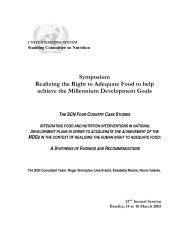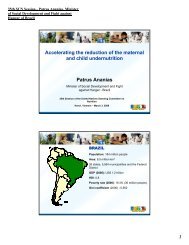Universal Salt Iodization (USI) - FTP Directory Listing
Universal Salt Iodization (USI) - FTP Directory Listing
Universal Salt Iodization (USI) - FTP Directory Listing
- No tags were found...
You also want an ePaper? Increase the reach of your titles
YUMPU automatically turns print PDFs into web optimized ePapers that Google loves.
48FEATURESwww.unsystem.org/scnAchieving and Sustaining <strong>USI</strong>:Doing It Well Through Quality Assurance, Monitoring and Impact EvaluationKevin M. Sullivan, Parminder S. Suchdev and Laurence Grummer-Strawn (Centers for Disease Control and Prevention, USA)Abstract: Assuring adequate iodine nutrition is key to preventing iodine deficiency disorders (IDD). The primary strategyfor assuring adequate iodine nutrition in most populations is through the iodization of salt. The methods for assuring saltis adequately iodized and the assessment of iodine nutrition of populations are described.Key words: assessment tool, IDD, iodine, iodized, ISPAT, quality assurance, monitoring, impact evaluation, salt, <strong>USI</strong><strong>Salt</strong> iodization and impact evaluationTo successfully eliminate iodine deficiency disorders (IDD), all salt for human and animal consumption mustbe properly fortified with iodine. The Iodized <strong>Salt</strong> Program Assessment Tool (ISPAT) is useful for reviewing anational salt iodization program, including its monitoring and evaluation (Houston et al 1999). We first discussissues involved with ensuring that salt is properly iodized and then discuss assessment of the iodine nutritionstatus of a population.<strong>Salt</strong> iodization at production and importThe goal of <strong>Universal</strong> <strong>Salt</strong> <strong>Iodization</strong> (<strong>USI</strong>) is to ensure that all salt for human and animal consumption, bothlocally produced and imported, is properly iodized according to the national legislative and regulatory environment(Nathan 1999). In addition to quality assurance by the producer of the iodization process (“internalmonitoring”), inspection by government authorities (“external monitoring”) is needed to assess the quality ofthe internal monitoring and, in cases of non compliance, enforce fines or other penalties (Sullivan et al 1995).The testing of salt for iodine levels usually requires the use of both quantitative and semi-quantitative tests.Importers of salt must ensure that the salt they order complies with national regulations, and the appropriategovernment agency needs to monitor points of entry. Points of entry must be monitored to prevent noniodizedor improperly iodized salt from entering the country. To ensure proper iodization of salt, the importeror government may enter into contracts with outside agencies that specialize in ensuring the quality of productsto be imported (Sullivan et al 1995).For the long-term success of the elimination of iodine deficiency disorders, all salt must be iodized to correctlevels. Too little iodine in the salt can allow the negative consequences of iodine deficiency to occur, and toomuch iodine in the salt may increase the risk of adverse events, such as iodine induced thyrotoxicosis, andcan undermine the public image of <strong>USI</strong> (WHO/UNICEF/ICCIDD 1998).The Republic of Georgia has a history of iodine deficiency (UNICEF 2004a). In February 2005, the governmentenacted a law that banned the import and sale of non iodized salt. Currently, all iodized salt in Georgiafor both human and animal consumption is imported, primarily from the Ukraine, with small amounts fromGreece, Azerbaijan, Russia and Turkey. Regulations mandate iodization at 40 +15 parts per million (ppm), inline with the World Health Organization (WHO) criteria of 20-40 ppm (WHO/UNICEF/ICCIDD 1996). At theimport level, all salt must pass through one of three major ports (Tbilisi, Batumi or Poti), where the CustomsDepartment inspects the salt and, if satisfactory, provides a certificate of authenticity stating that the salt isiodized (UNICEF 2004b).Monitoring at wholesale and retail levelsSome countries may be able to monitor iodized salt at the wholesale and retail levels. Usually the goal ofmonitoring at these levels is to ensure that wholesalers and retailers purchase and distribute only iodized salt.Some countries may have a governmental infrastructure for conducting inspections at these levels in a costeffective manner.In Georgia, little monitoring currently takes place at the wholesale or retail level. The Ministry of Agricultureand State Standards Department are responsible for inspecting salt availability, storage, and packaging. AsSCN NEWS # 35 back to contents







